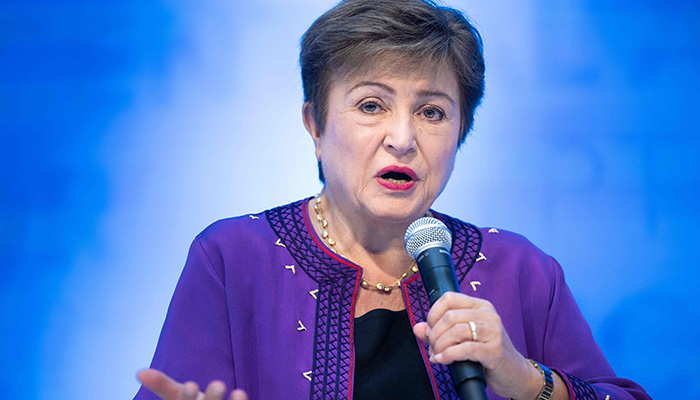IMF chief calls for unity on shared challenges in 'deeply troubled times'
Says global inflation wave retreating after resolute monetary policy action, moderating food and energy prices
The international community must come together despite the "difficult geopolitical environment" to tackle shared challenges like lackluster growth and the existential threat posed by climate change, the head of the IMF said Thursday.
Kristalina Georgieva, who has just started her second five-year term as the International Monetary Fund's managing director, spoke ahead of the Fund and the World Bank's annual gathering of financial leaders in Washington next week.
She used a speech in the US capital to celebrate the progress made on tackling inflation — while warning of the dangers ahead for the global economy.
"The big global inflation wave is in retreat," she said, noting that "a combination of resolute monetary policy action, easing supply chain constraints, and moderating food and energy prices is guiding us back in the direction of price stability."
"And this has been done without tipping the global economy into recession and largescale job losses," she added.
But while the inflation rate is falling, "the higher price level that we feel in our wallets is here to stay," she said, adding that higher prices were hitting the world's poorest economies and individuals the hardest.
Georgieva also confirmed that a new third chair for Africa on the IMF's executive board would be held by Ivory Coast.
Her speech comes just a few days before the IMF and World Bank's annual meetings get underway in Washington against the backdrop of growing conflict in the Middle East, and shortly before the US presidential election, in which the Republican former president Donald Trump is running against Democratic vice president Kamala Harris.
Trump has repeatedly threatened to hike tariffs, while also suggesting the president of the United States should have a greater say over monetary policy — a task currently reserved for the Federal Reserve, the independent US central bank.
In her speech, Georgieva praised the independence of central banks around the world, along with international financial institutions like the IMF, which provided financial support during the COVID-19 pandemic.
But she warned that the world is facing "a difficult geopolitical environment," with the expanding conflict in the Middle East adding to the challenges facing policymakers looking to tackle an "unforgiving combination" of lackluster global growth and high levels of public debt.
"We live in deeply troubled times," she said, warning that the peace dividend from the end of the Cold War "is increasingly at risk."
"In a world of more wars and more insecurity, defence expenditures may well keep rising while aid budgets fall further behind the growing needs of developing countries," she added.
"We must not allow this reality to become an excuse to do nothing to prevent a further fracturing of the global economy," she added.
-
Bitwise Crypto Industry innovators ETF: What investors should do in 2026?
-
Nintendo shares slide again as momentum fears grow
-
Gold, silver prices fallen sharply; What’s driving the drop?
-
Gold’s record climb: Experts question if its safety is ‘overstated’
-
Dubai unveils plans to construct street built with real gold
-
Netflix slams Paramount’s bid: 'Doesn't pass sniff test’ as Warner battle escalates
-
Ubisoft: Shares plunge amid restructuring plan and wave of games cancellations
-
Netflix revises Warner Bros. deal to $83 billion: All-cash offer












